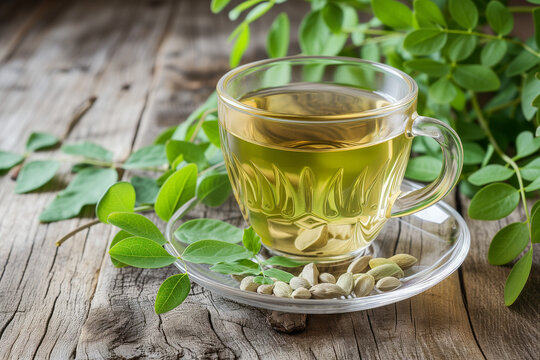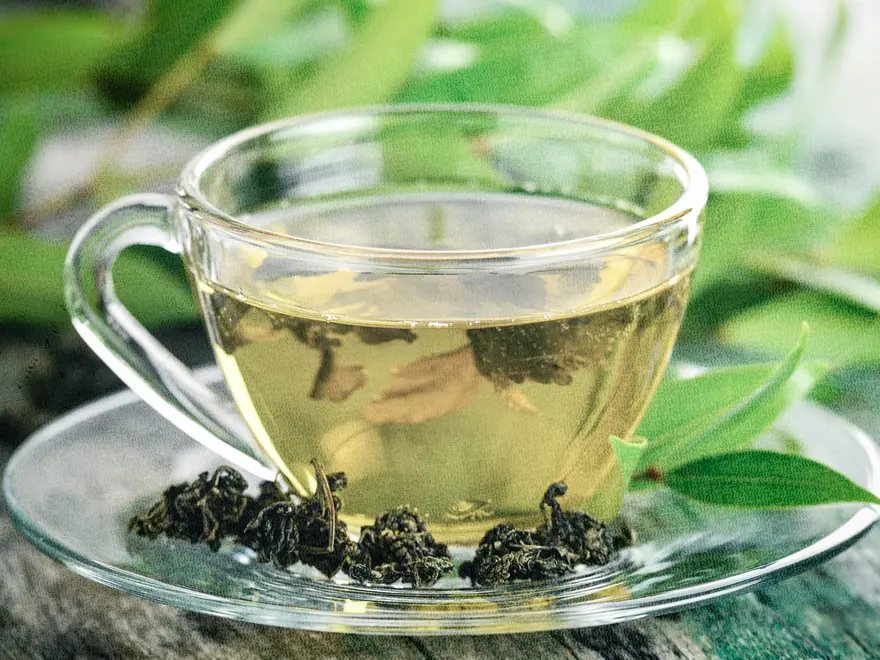In today’s health-conscious world, herbal teas have become more than just a soothing beverage—they’re part of a daily wellness routine. Among the many popular choices, Moringa tea and Green tea stand out as two of the most powerful natural drinks. Both are packed with antioxidants, essential nutrients, and unique health benefits. But when it comes to choosing between the two, the big question remains: Which one is healthier—Moringa tea or Green tea?
Let’s dive deep into their origins, nutritional values, health benefits, and differences to help you make an informed decision.
What Is Moringa Tea?

Moringa tea is made from the dried leaves of the Moringa oleifera tree, often called the “Miracle Tree.” Native to India and widely grown in tropical regions, moringa has been used in Ayurvedic medicine for centuries. Its leaves are dried and steeped in hot water to create a herbal tea that is naturally caffeine-free and loaded with vitamins, minerals, and antioxidants.
Nutritional highlights of moringa tea:
- Rich in Vitamin C, Vitamin A, and Vitamin E
- Contains calcium, iron, potassium, and magnesium
- Packed with plant-based protein and amino acids
- Abundant in polyphenols and flavonoids
What Is Green Tea?

Green tea comes from the leaves of the Camellia sinensis plant. Unlike black tea, green tea leaves are quickly steamed or pan-fired after harvesting to prevent oxidation, which helps retain their green color and nutrient profile. Green tea is well-known for its energizing caffeine content and powerful antioxidants, particularly catechins such as EGCG (Epigallocatechin gallate).
Nutritional highlights of green tea:
- Contains catechins, especially EGCG
- Provides caffeine for alertness
- Good source of manganese, folate, and potassium
- Rich in antioxidants that support metabolism
Health Benefits of Moringa Tea
- Boosts Immunity
Moringa is packed with Vitamin C and other antioxidants, making it excellent for strengthening the immune system. - Supports Heart Health
Studies suggest moringa may help regulate cholesterol and blood pressure, reducing cardiovascular risks. - Regulates Blood Sugar
Moringa leaves contain compounds that support insulin function, making them beneficial for people with diabetes. - Enhances Digestion
Its anti-inflammatory and antibacterial properties support gut health and aid digestion. - Improves Skin and Hair Health
Thanks to its high Vitamin E and antioxidant content, moringa helps protect the skin against oxidative stress and promotes healthy hair growth. - Caffeine-Free Energy
Unlike green tea, moringa tea is naturally caffeine-free, providing calm energy without jitters.
Health Benefits of Green Tea
- Boosts Metabolism and Weight Loss
The caffeine and catechins in green tea work together to enhance fat burning and metabolism, making it a popular choice for weight management. - Supports Brain Function
Caffeine and L-theanine in green tea improve alertness, memory, and focus without the crash associated with coffee. - Reduces Risk of Chronic Diseases
Green tea’s EGCG is linked to reducing risks of heart disease, certain cancers, and neurodegenerative conditions. - Improves Dental Health
Catechins in green tea kill bacteria and inhibit viruses, improving oral hygiene and reducing bad breath. - Rich in Antioxidants
These antioxidants fight free radicals, slowing aging and improving overall cellular health.
Moringa Tea vs. Green Tea: Nutritional Comparison
| Feature | Moringa Tea | Green Tea |
|---|---|---|
| Caffeine Content | 0 mg (caffeine-free) | 25–35 mg per cup |
| Antioxidants | High in polyphenols, Vitamin C, E | High in catechins (EGCG) |
| Vitamins | Rich in A, C, E, K, B-complex | Contains B vitamins, folate, small C |
| Minerals | High in calcium, iron, magnesium | Moderate potassium, manganese |
| Best For | Immunity, blood sugar, calm energy | Metabolism, brain health, weight loss |
Which One Is Healthier?
The answer depends on your health goals and lifestyle needs:
- If you want weight management, metabolism boost, or improved focus, Green tea may be the better choice.
- If you prefer a caffeine-free, nutrient-dense tea that supports immunity, digestion, and long-term health, Moringa tea shines.
In short, Green tea is great for short-term energy and fat burning, while Moringa tea provides a long-term nutritional powerhouse without caffeine dependency.
Can You Drink Both?
Absolutely! In fact, many wellness enthusiasts enjoy both teas at different times of the day:
- Morning/Early Afternoon: Green tea for an energy boost and focus.
- Evening/Night: Moringa tea for calm relaxation and overnight healing.
This way, you enjoy the unique benefits of both without overloading on caffeine.
How to Brew Moringa Tea and Green Tea
Moringa Tea:
- Boil 1 cup of water.
- Add 1–2 teaspoons of dried moringa leaves.
- Steep for 5–7 minutes.
- Strain and enjoy with honey or lemon.
Green Tea:
- Heat water to 80–85°C (not boiling).
- Add 1 teaspoon of green tea leaves or 1 tea bag.
- Steep for 2–3 minutes.
- Strain and enjoy. Avoid over-steeping to prevent bitterness.
Final Thoughts
Both Moringa tea and Green tea offer incredible health benefits and can easily fit into a balanced lifestyle. Green tea is best known for its fat-burning and brain-boosting properties, while moringa tea is a nutrient-rich, caffeine-free alternative that nourishes the body holistically.
At Treelogical Foods, we believe wellness comes from embracing nature’s best gifts. Whether you choose moringa tea, green tea, or both, you are taking a positive step toward a healthier, more energized life.
So, the real question isn’t which one is healthier? Instead, ask yourself: Which tea suits my body and lifestyle better? Either way, your health will thank you.



